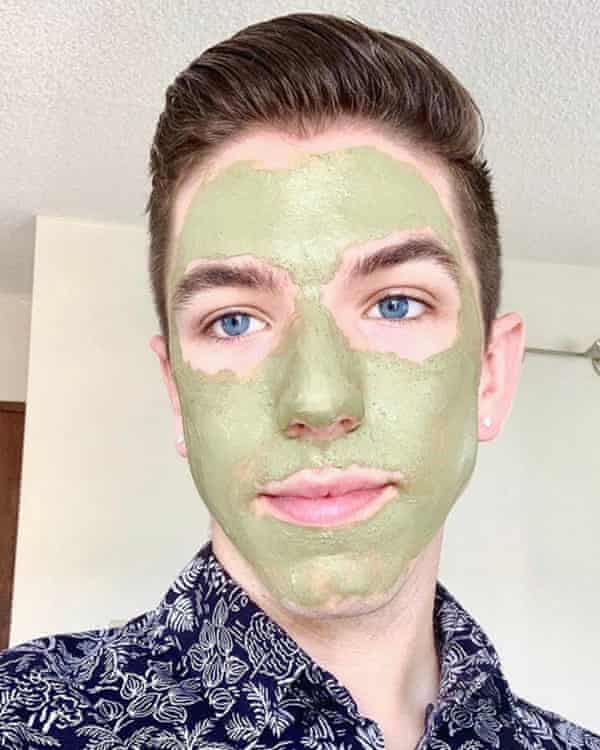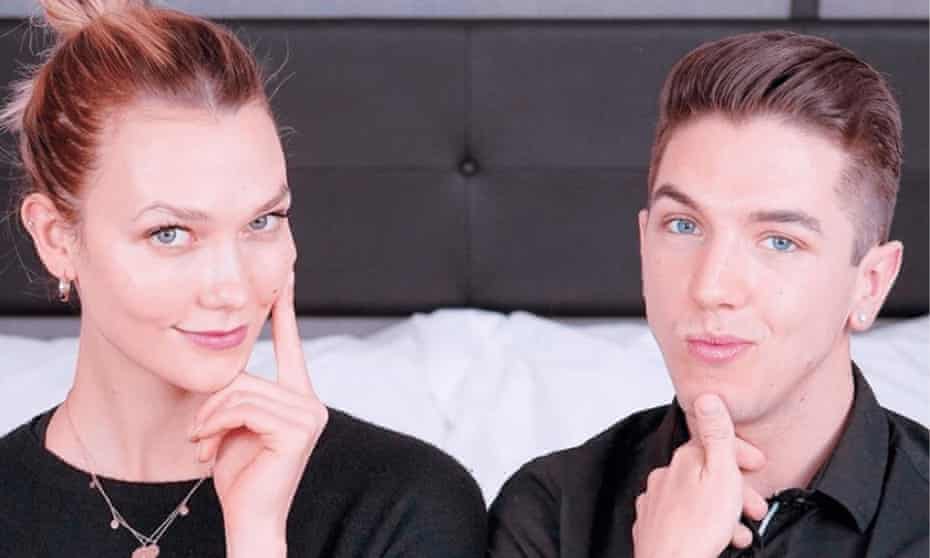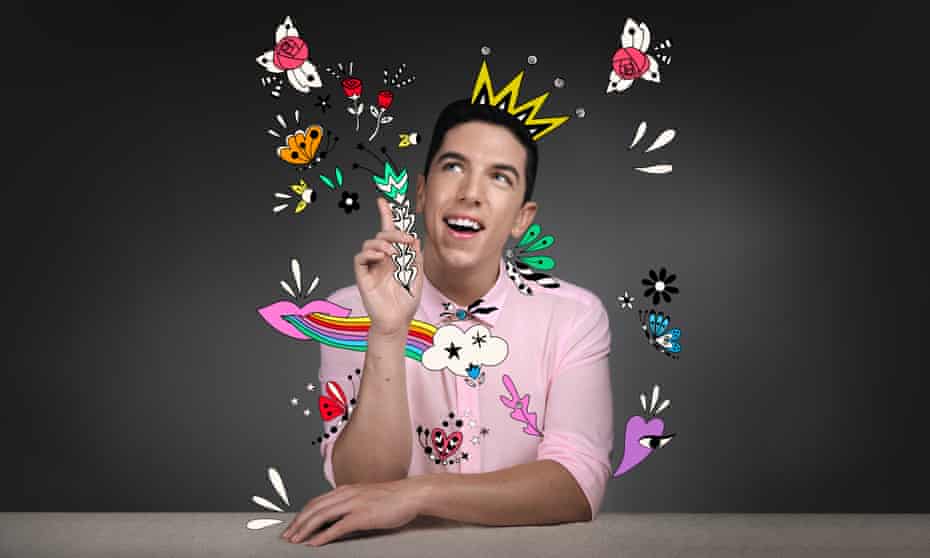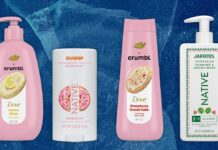Truthfully, I didn’t expect to blow up to this scale. And yes, I know this is going to sound clichéd, but if you told me, even a year ago, that it was going to be this big, I would not have believed it.” Considering the trajectory of Hyram Yarbro, the 25-year-old Gen Z skincare guru set on making skincare “accessible”, it is easy to believe him.
His success in the past year, driven by a lockdown-fuelled obsession with skincare and social media, has made Yarbro the world’s most powerful “skinfluencer”. His young, captivated, skincare-obsessed disciples – 1.2m on Instagram, 4.5m on YouTube, 6.8m on TikTok (pre-lockdown 1.0, it was 100,000) – all diligently follow his skincare recommendations via his unfiltered, straight-shooting videos. At the beginning of the pandemic, he says he was uploading content on YouTube five to six times a week and posting three TikToks a day. “But I’ve scaled it back a little,” he says now, “because I was literally not sleeping”.
The videos themselves are entertaining, charming and peppered with humour. Even his harsh reviews (like that of Fenty Beauty – the brand owned by singer Rihanna, so it takes some fortitude to openly criticise it) are delivered with a good-natured smile. Across his social media platforms he deciphers ingredients, debunks skincare myths and lifts the lid on the formulations of brands riding the empty wave of hype. His catchphrase, “Ingredients don’t lie, bitch” has already spawned limited-edition merch. His endorsement results in soaring sales (those who draw the short straw see sales plummet) and every brand wants to partner with him. He says he receives “30 to 40 brand sponsorship offers per day,” and despite having zero medical qualifications (“I ask people not to place my recommendations above a dermatologist’s; my role is simply to help people understand the basics of skincare”), Yarbro has become the most trusted skincare authority for young people all over the world: #skincarebyhyram has had 2.3bn hits on TikTok. No wonder the New York Times called him “Gen Z’s skincare whisperer”.
I’m meeting Yarbro to discuss his own hotly anticipated skincare line, Selfless by Hyram, a brand he says he developed in conjunction with the founders of the Inkey List, the ingredients-led skincare brand, and he’s hoping that his line will also be a “catalyst for creating social change”. It is also set to make him and the social causes it supports millions – not bad for an ex-Mormon raised on a cattle ranch in Arizona who, just a few years ago couldn’t afford his rent and lived on 25 cents a day.
When I tell Yarbro that I’ve spent the past few hours prior to our interview staring at his face via his addictive YouTube and TikTok accounts, he laughs sheepishly – “Oh dear, I apologise.” After watching so many of his videos, his self-deprecating manner feels familiar, as does his high energy, blemish-free skin and a certain lack of vanity, which seems to be his default setting.

“It’s been a crazy day”, he explains. “I had to be up until 4am (by the time of our call he had had less than two hours’ sleep). “I had to do calls with some incredible people across the world for one of the social elements of the launch.” He has prioritised climate change and access to clean drinking water as the two causes he will launch the brand with. For someone who has the ear of Gen Z, a demographic increasingly known to align their wallets with social causes, it is a move deemed savvy by industry insiders.
Lisa Payne, senior beauty editor at trend-forecasting agency Stylus, told me: “Based on his current engagement, his earning potential is limitless as shrewd beauty businesses continue to seek these rare, but dazzlingly authentic and knowledgable voices in a sea of flat, profit-driven influencers.”
That said, there is still a question of authenticity that exists around other social-media influencers launching commercial enterprises as an extension of their brand – be it via an autobiography at the ripe old age of 20 or a beauty range of which any actual involvement in its creation is questionable – . (How else do you explain an influencer with a makeup brand who can’t remember the name of the products?) Yarbro, on the other hand, says his humanitarian stance has always been part of the bigger picture. “I’ve grown up on YouTube, I absolutely love skincare, it is so much fun, but the thing that has always driven me is wanting to make a positive difference in the world. Yes, skincare was the thing that built these opportunities and built this career, but I’ve always imagined myself within the non-profit sector and within social entrepreneurship”.
Yarbro grew up in Arizona, one of five children. He always wanted to do “big things with my life,” he says. “The benefit of growing up in a very small town is that when you’re living in an environment where the closest neighbours are, you know, a far, far, walk away and the closest grocery store is a 35-minute drive away, it helps you gain an appreciation for any type of opportunity that comes your way.” However, growing up in a rural environment had its drawbacks. “My parents always pushed me and my siblings to dream big. Which I’m very grateful for. But it wasn’t the best…” he pauses. “It wasn’t the best, you know, living situation growing up because I was trying to come to terms with my sexuality.”
Yarbro’s family were members of the Church of the Latter Day Saints – , where homosexuality is more than frowned upon. It was, Yarbro explains, “an extremely suppressive environment – in and outside the house – which used religion to justify prejudice. It wasn’t uncommon to hear extremely…” he takes a breath “…extremely violent rhetoric and dangerous remarks made about gay people. So it was a protective mechanism and best for my own safety to remain as secretive as possible about my identity.”

In 2014, aged 18, he left Arizona and the Mormons and moved to Hawaii, where he still lives now. He speaks about Hawaii with deep affection and gratitude, calling it his “place of refuge and therapy”. “For the first time ever I felt, ‘Wow, I’m in a place where, you know, people don’t really care [about my sexuality] and you can be whoever you want to be. I thought I was only going to be here for two years and yet I’m still here. I’ve just absolutely fallen in love with it.”
The initial years were tough: “I had to take time to focus on recovery, coming to terms with my sexuality, healing from the trauma of the past.” He credits his social-media community with “saving his life”. In 2017, the year in which he started his YouTube channel (“I was earning $20 a month”) while working two lowly paid jobs, Yarbro attempted to take his own life.
He has since shared this experience, as well as his battle with an eating disorder and self-harming, on his YouTube platform. “During that time I felt like I wasn’t going anywhere. I had to worry about how I was going to feed myself and how I was going to pay the rent and seeing all of these opportunities melt away because I wasn’t able to afford to keep going to school… It was very discouraging. As I started to grow on YouTube and see this incredible community build, it gave me a reason for wanting to live. The amount of love and support they poured out to me helped me realise my worth. They are the reason I’m in this position now”.
His position means that money is no longer an issue – . He freely admits that he is offered numerous deals, many of which mean he wouldn’t need to work for “at least a year” but he turns 95% of them down, saying: “You can lose yourself and lose the trust of your audience by just working with anyone.”
He refuses to be drawn on how much he is worth (currently rumoured to be around $3m). “I’m not super comfortable disclosing that,” he says, apologetically. “I know there’s curiosity, but I’ve just seen that kind of thing blow up in people’s faces so… For me the most encouraging thing about being in this position is, you know, I grew up with very limited money and it was only four years ago that I had to drop out of college because I couldn’t afford it. I was taking a ramen noodle packet and splitting it in half: one was breakfast, one was dinner. I was doing that for months. And I remember moments of crying and telling myself, I’m literally going to be homeless if I don’t figure something out by the end of the week.” Yarbro explains how those moments really helped him gain an appreciation for what money can do. “Money is only a tool and it’s about how you use it. That really will determine the type of life you lead and the type of difference you can make.”
Our conversation turns to his influencer peers on social media, who seem to be routinely involved in online drama – from TikTok’s Addison Rae, accused of appropriating dances from Black TikTokers without crediting them on The Tonight Show Starring Jimmy Fallon to the serious underage sexting and grooming allegations levied against makeup influencer James Charles, leading him to be dropped by beauty companies and demonetised by YouTube.
I ask Yarbro what he makes of his counterparts and the controversies. He is diplomatic, sidestepping commenting on any specific situation, but clear in his response. “Yeah, it’s very disappointing. Everyone makes mistakes and I try to be open-minded, but I think we as content creators have a responsibility to use our platform for the greater good. We’re able to speak to millions of people, young people, specifically, who are the primary proponents of global social change. We have the potential to change the world”.

This may sound self-important and a little overblown until you consider the power he wields in the skincare market, which is currently worth $532bn globally. Skincare brands popular with Gen Z, such as CeraVe, will testify to this – they reported a 65% increase in sales after Yarbro’s endorsement; their products sold out everywhere. Yarbro is uneasy about his clout, preferring to downplay it with a gentle sigh. “I mean, I know you said the word ‘power’ but I try not to see it that way. If I truly think about my influence, it would be too much pressure and would just stress me out.”
I ask him what his parents think about his success. He answers with a hint of sadness, “Unfortunately, while I am in touch with a few of my siblings, I’m not in contact with the rest of my family. Not being able to have a relationship with my parents was one of the hardest learning lessons. So yes, I don’t know what their perspective is of me, but I truly don’t wish ill on them.”
Considering the difficulties he faced at home, I comment that his attitude seems incredibly generous. He responds that he was actually “very selfish” growing up, but that a humanitarian school trip to Fiji and Tonga at 16 changed that. “It made me angry that people don’t have access to basic human rights and they have to struggle every single day. I felt it was wrong that I just lived my normal life, that I led a life of privilege and opportunity. Even with the limited opportunity I had. And it really sparked something inside me and completely transformed me as a person.”
As we begin to wrap up our conversation, I ask Yarbro whether he plans to carry on creating skincare content on social media. He is positive that he won’t give it up. “But I hope this brand opens up opportunities for me to expand further in the philanthropic space,” he says, smiling. “It’s an opportunity to make a huge difference without having to be Greta Thunberg!” More than anything, though, he says he hopes it inspires people and shows them what is possible, “even from a small-town cattle ranch boy like me”.
Hyram’s skincare line, Selfless, can be found in the UK at uk.selflessbyhyram.com







